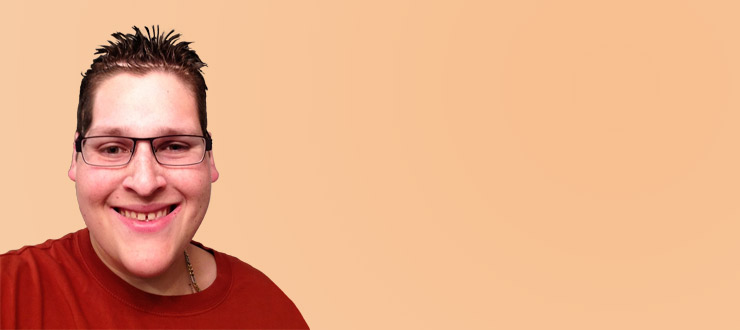
Brandon Sheremeta now lives in his own apartment, thanks to techniques
he learned at the Robin Easey Centre.
When he was five, Brandon Sheremeta was diagnosed with a brain tumour and had his first surgery. Two years later, a second surgery involved removing his pituitary gland, followed by radiation therapy. The treatments appeared to work and the tumour stopped growing. But Sheremeta was left with a condition called panhypopituitarism, which meant excessive fatigue, weight gain and emotional instability.
Sixteen years later, another tumorous growth in his brain affected Sheremeta’s vision. His surgeon had to sever the optic nerve to remove the tumour completely. Sheremeta was told his vision would never be restored.
For two and half years, he prayed for a miracle, and one day it came. His sight came back.
When Sheremeta arrived at the Robin Easey Centre, an extension of The Ottawa Hospital Rehabilitation Centre’s Acquired Brain Injury Program, he was highly anxious about being away from home for the first time. The side effects of his tumours and surgeries included cognitive challenges with memory, organization and planning. He was well over 500 pounds and was scheduled to undergo bariatric surgery.
But as soon as he was admitted as a resident, he felt a new sense of understanding and acceptance.
“Finally I’ve found a place where people know what I’m going through,” said Sheremeta. In the Tuesday support groups, other patients told stories about how the Robin Easey Centre had changed their lives. He thought, “This place is going to help me so much.”
Through innovative and creative approaches to treatment, the centre’s team offered Sheremeta a chance to learn and master the skills required to live independently, despite his medical conditions.
“Rehabilitation also involved constructing a structured lifestyle with rest periods to help maximize cognitive functioning during peak task times,” said Dr. Mark Ferland, Neuropsychologist and Clinical Leader of the Robin Easey Centre. “We introduced him to various electronic aids and self-monitoring techniques to better support his memory and ability to generate goals, organize and plan. With these techniques, he was able to monitor his dietary and exercise requirements, before and after bariatric surgery.”
One year after becoming a Robin Easey Centre resident, Sheremeta now lives in an apartment on his own, has lost 170 pounds, has a good social network and is feeling great. He’s looking for a job, continues to attend weekly group discussions and inspires others who are just starting out in the program.
“He’s a role model for all the patients,” said Dr. Ferland. “Everyone adores him.”
“I am the happiest I have ever been and my family sees that,” said Sheremeta. “I’ll be part of the Robin Easey family for life. The centre was the single greatest thing that has ever happened to me and I am forever grateful.”

Support patient care and research at
The Ottawa Hospital


 To reset, hold the Ctrl key, then press 0.
To reset, hold the Ctrl key, then press 0.